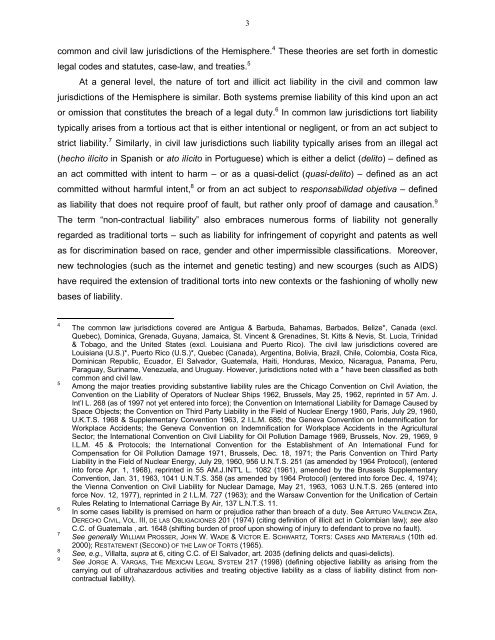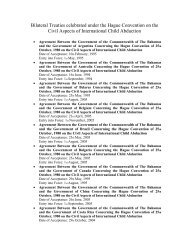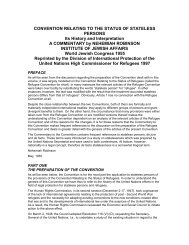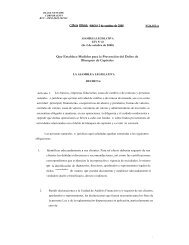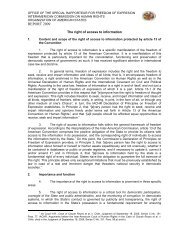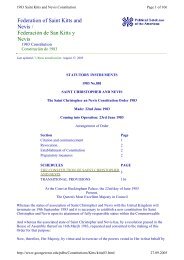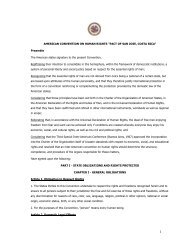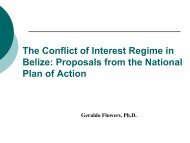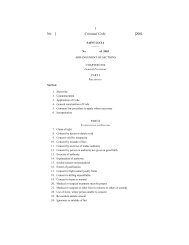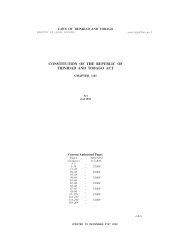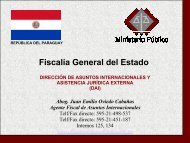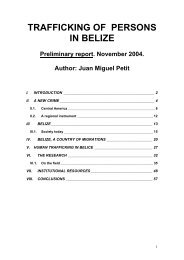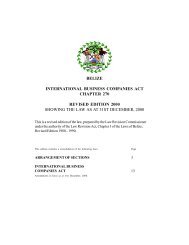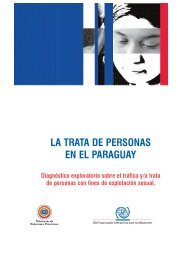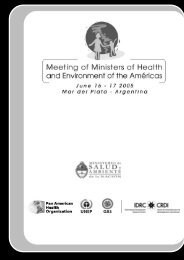Jurisdiction and choice of law for non-contractual obligations ... - OAS
Jurisdiction and choice of law for non-contractual obligations ... - OAS
Jurisdiction and choice of law for non-contractual obligations ... - OAS
Create successful ePaper yourself
Turn your PDF publications into a flip-book with our unique Google optimized e-Paper software.
3<br />
common <strong>and</strong> civil <strong>law</strong> jurisdictions <strong>of</strong> the Hemisphere. 4 These theories are set <strong>for</strong>th in domestic<br />
legal codes <strong>and</strong> statutes, case-<strong>law</strong>, <strong>and</strong> treaties. 5<br />
At a general level, the nature <strong>of</strong> tort <strong>and</strong> illicit act liability in the civil <strong>and</strong> common <strong>law</strong><br />
jurisdictions <strong>of</strong> the Hemisphere is similar. Both systems premise liability <strong>of</strong> this kind upon an act<br />
or omission that constitutes the breach <strong>of</strong> a legal duty. 6 In common <strong>law</strong> jurisdictions tort liability<br />
typically arises from a tortious act that is either intentional or negligent, or from an act subject to<br />
strict liability. 7 Similarly, in civil <strong>law</strong> jurisdictions such liability typically arises from an illegal act<br />
(hecho ilícito in Spanish or ato ilícito in Portuguese) which is either a delict (delito) – defined as<br />
an act committed with intent to harm – or as a quasi-delict (quasi-delito) – defined as an act<br />
committed without harmful intent, 8 or from an act subject to responsabilidad objetiva – defined<br />
as liability that does not require pro<strong>of</strong> <strong>of</strong> fault, but rather only pro<strong>of</strong> <strong>of</strong> damage <strong>and</strong> causation. 9<br />
The term “<strong>non</strong>-<strong>contractual</strong> liability” also embraces numerous <strong>for</strong>ms <strong>of</strong> liability not generally<br />
regarded as traditional torts – such as liability <strong>for</strong> infringement <strong>of</strong> copyright <strong>and</strong> patents as well<br />
as <strong>for</strong> discrimination based on race, gender <strong>and</strong> other impermissible classifications. Moreover,<br />
new technologies (such as the internet <strong>and</strong> genetic testing) <strong>and</strong> new scourges (such as AIDS)<br />
have required the extension <strong>of</strong> traditional torts into new contexts or the fashioning <strong>of</strong> wholly new<br />
bases <strong>of</strong> liability.<br />
4<br />
5<br />
6<br />
7<br />
8<br />
9<br />
The common <strong>law</strong> jurisdictions covered are Antigua & Barbuda, Bahamas, Barbados, Belize*, Canada (excl.<br />
Quebec), Dominica, Grenada, Guyana, Jamaica, St. Vincent & Grenadines, St. Kitts & Nevis, St. Lucia, Trinidad<br />
& Tobago, <strong>and</strong> the United States (excl. Louisiana <strong>and</strong> Puerto Rico). The civil <strong>law</strong> jurisdictions covered are<br />
Louisiana (U.S.)*, Puerto Rico (U.S.)*, Quebec (Canada), Argentina, Bolivia, Brazil, Chile, Colombia, Costa Rica,<br />
Dominican Republic, Ecuador, El Salvador, Guatemala, Haiti, Honduras, Mexico, Nicaragua, Panama, Peru,<br />
Paraguay, Suriname, Venezuela, <strong>and</strong> Uruguay. However, jurisdictions noted with a * have been classified as both<br />
common <strong>and</strong> civil <strong>law</strong>.<br />
Among the major treaties providing substantive liability rules are the Chicago Convention on Civil Aviation, the<br />
Convention on the Liability <strong>of</strong> Operators <strong>of</strong> Nuclear Ships 1962, Brussels, May 25, 1962, reprinted in 57 Am. J.<br />
Int’l L. 268 (as <strong>of</strong> 1997 not yet entered into <strong>for</strong>ce); the Convention on International Liability <strong>for</strong> Damage Caused by<br />
Space Objects; the Convention on Third Party Liability in the Field <strong>of</strong> Nuclear Energy 1960, Paris, July 29, 1960,<br />
U.K.T.S. 1968 & Supplementary Convention 1963, 2 I.L.M. 685; the Geneva Convention on Indemnification <strong>for</strong><br />
Workplace Accidents; the Geneva Convention on Indemnification <strong>for</strong> Workplace Accidents in the Agricultural<br />
Sector; the International Convention on Civil Liability <strong>for</strong> Oil Pollution Damage 1969, Brussels, Nov. 29, 1969, 9<br />
I.L.M. 45 & Protocols; the International Convention <strong>for</strong> the Establishment <strong>of</strong> An International Fund <strong>for</strong><br />
Compensation <strong>for</strong> Oil Pollution Damage 1971, Brussels, Dec. 18, 1971; the Paris Convention on Third Party<br />
Liability in the Field <strong>of</strong> Nuclear Energy, July 29, 1960, 956 U.N.T.S. 251 (as amended by 1964 Protocol), (entered<br />
into <strong>for</strong>ce Apr. 1, 1968), reprinted in 55 AM.J.INT'L L. 1082 (1961), amended by the Brussels Supplementary<br />
Convention, Jan. 31, 1963, 1041 U.N.T.S. 358 (as amended by 1964 Protocol) (entered into <strong>for</strong>ce Dec. 4, 1974);<br />
the Vienna Convention on Civil Liability <strong>for</strong> Nuclear Damage, May 21, 1963, 1063 U.N.T.S. 265 (entered into<br />
<strong>for</strong>ce Nov. 12, 1977), reprinted in 2 I.L.M. 727 (1963); <strong>and</strong> the Warsaw Convention <strong>for</strong> the Unification <strong>of</strong> Certain<br />
Rules Relating to International Carriage By Air, 137 L.N.T.S. 11.<br />
In some cases liability is premised on harm or prejudice rather than breach <strong>of</strong> a duty. See ARTURO VALENCIA ZEA,<br />
DERECHO CIVIL, VOL. III, DE LAS OBLIGACIONES 201 (1974) (citing definition <strong>of</strong> illicit act in Colombian <strong>law</strong>); see also<br />
C.C. <strong>of</strong> Guatemala , art. 1648 (shifting burden <strong>of</strong> pro<strong>of</strong> upon showing <strong>of</strong> injury to defendant to prove no fault).<br />
See generally WILLIAM PROSSER, JOHN W. WADE & VICTOR E. SCHWARTZ, TORTS: CASES AND MATERIALS (10th ed.<br />
2000); RESTATEMENT (SECOND) OF THE LAW OF TORTS (1965).<br />
See, e.g., Villalta, supra at 6, citing C.C. <strong>of</strong> El Salvador, art. 2035 (defining delicts <strong>and</strong> quasi-delicts).<br />
See JORGE A. VARGAS, THE MEXICAN LEGAL SYSTEM 217 (1998) (defining objective liability as arising from the<br />
carrying out <strong>of</strong> ultrahazardous activities <strong>and</strong> treating objective liability as a class <strong>of</strong> liability distinct from <strong>non</strong><strong>contractual</strong><br />
liability).


